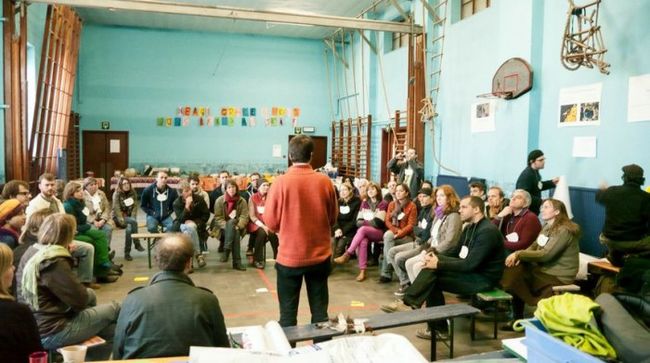Hub of the Month: Belgium
By rob hopkins 11th November 2016
Each month we’ll be finding out more about one of our national Transition Hubs. We start with Réseau Transition, the Belgian Transition Network for French-speaking initiatives. The first meetings between Belgian French-speaking initiatives started in 2011, and led to the first “modest but awesome” meeting between initiatives, the “Conviviale” held in 2012. The ‘Réseau Transition.be’ was born.
Its goal is to “encourage, inspire, connect and offer support to the Transition initiatives, as well as promote their emergence“. Its main activities are related to Transition Trainings (more than 500 people trained since 2012 in Inner Transition, Launch, Thrive, collective intelligence tools, and so on), direct support through the organization of specific workshops based on initiative needs and the creation of mutualized tools, the creation of links with other organizations active in the broad definition of Transition and the promotion of Transition in Belgium.
Our team has 4 part-time happy workers, which are supported by many volunteers from the initiatives. We are lucky to receive funding from the Walloon and Brussels regions, and launched a large crowdfunding campaign last June to increase our funding resilience. Here is a short video that captures a sense of what’s happening across the country:
Initiatives: The number of initiatives has grown strongly in 2016 (figures for Wallonia and Brussels). Starting at ~40 initiatives (check out the map here) in February 2016, there are 70 registered today. Among these 70 points on the map, 55 are Transition Towns (city, county, or villages in Transition) and 15 are associations close to Transition philosophy. Over 2016 we expect the number of initiatives in Wallonia and Brussels to have doubled.
Emerging new enterprises: While most Transition initiatives start with the usual projects we see in Transition groups around the world (gardens, markets, Repair Cafes and so on), Belgium is seeing recently a trend towards groups creating new markets to sell local producers vegetables and products:
- The project Ceinture Alimentaire de Liège, initiated by Liège en Transition, has just started on the October 1st a shop called ‘Les petits producteurs’. You’ll find photos online and a video from the local TV here
- Grez en Transition also launched a local store in a small village where all stores closed a couple of years ago
- Etterbeek en Transition is working with Oxfam and a local producers cooperative to create together a new shop that should open in February 2017
Inner Transition: This is an important topic for Belgian initiatives. The first congress on Ecopsychology just ended near Namur (1&2 October), and was a big success. It was initiatied by Réseau Transition and other partners. Here is the first intention:
“This congress has emerged because we are challenged as psychotherapists, environmentalists, transitioners, social workers and of course as human beings by the deep inner evolution that we all need to dare to live in our hearts, bodies and minds in order to create together the sustainable, respectful and generous world that we want to see flourish at the heart of our beautiful planet Earth … “
There is a strong connection between the movement and therapists who receive more and more people suffering, not only about personal matters, but because of the state of the world.
Trainings: Still lots of trainings are happening, with lots of interest for example for our “Together, but differently” and “Launch online” trainings (our first online training started end of October). The hub loves to organize trainings directly in the initiatives localities, because it enables more local transitioners to participate and reinforce the existing dynamics. This article talks about how a training organized in Gesves (part of the Gesves en Transition team below) was very stimulated by the “Launch training” organized in their village.
Transition visibility: Transition has a nice visibility in media, and about 15 newspaper articles were published on Transition in 2016. Josue Dusoulier was recently on a TV programme called ‘Demain et Apres’ which you can see here on La Une TV (similar to BBC in Belgium) and we’re collaborating officially with the ‘Imagine, Demain le Monde’ magazine .. Another interesting illustration of this interest in Transition is the fact that OXFAM in Belgium is working on a new 2020 Strategy, and has 3 axis: volunteers, short food circuits and “linking with the Transition movement”.
True links and collaborations are also created with the Colibris (initiated by Pierre Rabhi and Cyril Dion) organization, since we are so close. All of this could be linked to the movie ‘Demain’, but not exclusively.
. The word ‘local’ is very trendy in Belgium. So trendy in fact that Quick (sort of Belgian McDonalds, No.1 in Belgium) has launched a campaign on “local burgers” (lol, see right) and we are also seeing in the media a couple of articles against local (which is always a good indication that the topic is trendy).
Local currencies: A new local currency has just been launched (on October 1st) by several neighboring Transition initiatives, called ‘Le Volti‘. The interesting part is that it’s mainly circulating in famous beer cities: Rochefort and Ciney. A kind of ‘craft currency’! Another new currency is also being created for the city of Namur, called LumSou. Read more about that here.
Lastly, here’s another advert currently visible on billboards across Belgium at the moment, which possibly shows the wider influence of Transition/’Demain’ on Belgian culture, but at the same time really doesn’t get it at all. The caption reads “We have the Power to Change …. Our car”.
Here is their latest newsletter.





